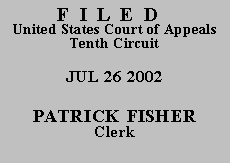

Petitioner Sylvia Campo Wiechmann, appearing pro se, appeals the district court's denial of her motion for a temporary restraining order/preliminary injunction. We exercise jurisdiction pursuant to 28 U.S.C. § 1292(a)(1) and affirm.
On January 29, 2002, Wiechmann filed a motion and related pleadings for a "federal injunction," alleging she was being illegally confined at the Colorado Mental Health Institution in Pueblo, Colorado. She argued that she was a federal judge and that, in order to be criminally prosecuted or involuntarily committed, she first must be impeached. On February 15, 2002, she filed an application for a writ of habeas corpus, again alleging she was being illegally confined. On March 12, 2002, the magistrate judge directed her to file an amended habeas application because her initial filing was unclear and did not comply with Federal Rule of Civil Procedure 8 (a) and (e)(1). The magistrate granted Wiechmann thirty days to amend her application and directed that if she failed to do so, the action would be dismissed without further notice.
On March 15, 2002, the district court rejected Wiechmann's initial pleadings, which it construed as a motion for temporary restraining order and/or preliminary injunction. The court found that she failed to allege any facts indicating that she would suffer immediate and irreparable harm if the requested injunctive relief was not granted. The court further concluded that Wiechmann failed to establish (1) a substantial likelihood that she would ultimately prevail on the merits of her habeas application, (2) that the threatened injury outweighed any damage the injunction might cause the opposing party, or (3) that the requested injunctive relief would not be adverse to the public interest.
We review a district court's denial of a temporary restraining order or preliminary injunction for an abuse of discretion. See Prairie Band of Potawatomi Indians v. Pierce, 253 F.3d 1234, 1243 (10th Cir. 2001). A district court abuses its discretion if it "'commits an error of law, or is clearly erroneous in its preliminary factual findings.'" Id. (quoting ACLU v. Johnson, 194 F.3d 1149, 1155 (10th Cir. 1999)). To merit a temporary restraining order or preliminary injunction, the movant must establish that "(1) [she] has a substantial likelihood of prevailing on the merits; (2) [she] will suffer irreparable injury if [she] is denied the injunction; (3) [her] threatened injury outweighs the injury that the opposing party will suffer under the injunction; and (4) an injunction would not be adverse to the public interest." Country Kids 'N City Slicks, Inc. v. Sheen, 77 F.3d 1280, 1283 (10th Cir. 1996). After carefully examining the record on appeal, we find no abuse of discretion on the part of the district court.
We AFFIRM the denial of Wiechmann's motion for temporary restraining order/preliminary injunction. The motion for release pending appeal is DENIED. The motion to proceed in forma pauperis on appeal is DENIED.
Entered for the Court
Mary Beck Briscoe
Circuit Judge
*.This order and judgment is not binding precedent, except under the doctrines of law of the case, res judicata, and collateral estoppel. The court generally disfavors the citation of orders and judgments; nevertheless, an order and judgment may be cited under the terms and conditions of 10th Cir. R. 36.3.